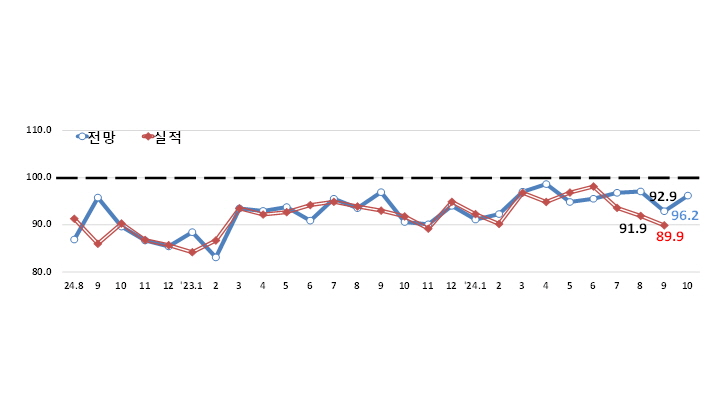한국경제인협회가 매출액 기준 600대 기업을 대상으로 기업경기실사지수(Business Survey Index)를 조사한 결과, 2024년 10월 BSI 전망치는 96.2를 기록했다. 이런 경기 부진 전망에도 불구하고, 반도체가 포함된 전자 및 통신장비(106.3), 반도체 부품의 일반·정밀기계 및 장비(115.0)가 호조로 전망돼 반도체 수출 강세가 지속될 것으로 보인다.

▲종합경기 BSI 추이
한경협 10월 BSI 92.6, 반도체 수출 강세 전망
경제인들이 지속적인 경기 부진 속에서도 반도체 수출이 강세를 보이며, 우리 경제를 이끌 것으로 기대했다.
한국경제인협회가 매출액 기준 600대 기업을 대상으로 기업경기실사지수(Business Survey Index)를 조사한 결과, 2024년 10월 BSI 전망치는 96.2를 기록했다.
BSI 전망치는 지난 9월(92.9) 대비로는 3.3p 반등했지만 2022년 4월(99.1)부터 기준선 100을 31개월 연속 하회하고 있다.
9월 BSI 실적치는 89.9로 조사됐다. 2022년 2월(91.5)부터 32개월 연속 부진으로 나타나 기업들의 실적 악화가 장기화되는 모습이다.
업종별 10월 경기 전망은 제조업(96.4)과 비제조업(96.0)의 동반 부진이 예상된다. 제조업 BSI는 올해 3월(100.5) 기준선 100을 초과한 이후, 4월(98.4)부터 7개월 연속 기준선 아래에 머무르고 있다. 비제조업 BSI는 올해 7월(105.5) 기준선 100을 초과한 이후 3개월 연속 기준선에 못 미쳤다.
10월 제조업 전망은 세부 업종(총 10개)의 수출 분야에 따라 전망이 크게 엇갈렸다. △일반·정밀기계 및 장비(115.0) △비금속 소재 및 제품(107.1) △전자 및 통신장비(106.3) △자동차 및 기타운송장비(105.4) 등 4개 업종은 호조 전망을 보였다. 이를 제외한 나머지 6개 업종주4)은 업황 악화가 전망된다.
한경협은 제조업 BSI는 반도체가 포함된 전자 및 통신장비(106.3), 반도체 부품의 일반·정밀기계 및 장비(115.0)가 호조로 전망돼 반도체 수출 강세가 지속될 것으로 보이며, 자동차 및 기타운송장비(105.4)가 7개월 만에 기준선 100을 돌파하며 자동차 수출 역시 반등이 기대된다. 반면, 이외의 업종은 고금리 장기화 및 내수 위축의 여파주8) 등으로 부정적 전망이 나타난 것으로 추정했다.
10월 조사 부문별 BSI는 모든 부문에서 부정적 전망(△수출98.1 △채산성95.9 △고용95.6 △내수 95.4 △자금사정94.0 △투자90.2 △재고103.0)으로 나타났다. 비록 기준선에는 미치지 못했으나 수출(98.1)은 9월(94.5) 대비 3.6포인트 반등한 반면, 내수(95.4)는 9월(96.3) 대비 0.9포인트 반락했다. 투자(90.2)는 2023년 4월(88.6) 이후 18개월 만에 최저치를 나타냈다. 내수, 수출, 투자의 트리플 부진은 올해 7월 전망 이후 4개월 연속 이어지고 있다.
한경협은 기업·가계 대출 연체율이 코로나19 시기와 유사한 모습을 보이는 등 투자와 소비 여력이 크게 위축된 상황에서, 지정학적 분쟁 장기화, 미 대선 등 대외 불확실성의 확대로 내수와 투자 부진이 이어지고 있다고 풀이했다.
이상호 한경협 경제산업본부장은 “최근 수출의 높은 증가세에도 불구하고 소비 위축 등 길어지는 내수 침체로 4분기 경기회복이 불확실한 상황”이라며 “내수 진작과 투자 확대를 위해 금리 안정화와 함께 기업의 활력을 꺾는 규제(이사의 충실의무 확대, 집중투표제 의무화 등) 입법을 지양할 필요가 있다”고 주장했다.
